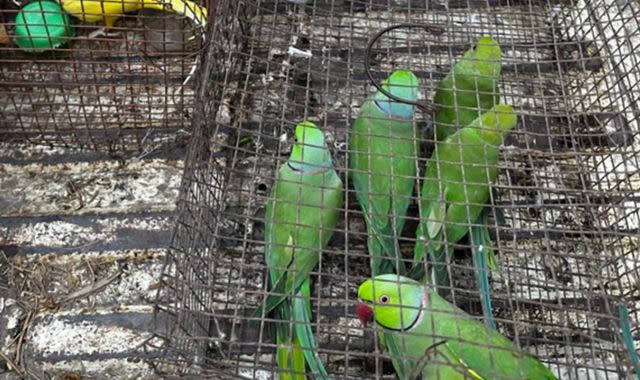Crocodile blood and big cat body parts among illegal wildlife products seized in operation involving UK Border Force

Thousands of illegal wildlife products - including reptile blood - were seized by UK Border Force as part of a global operation against organised crime.
Clothes and accessories made from snakeskin, turtle shell and ivory, as well as consumer products containing cactus, orchid and caviar were seized in the UK in October.
Known as Operation Thunder, the 145 seizures made at the border also included 53 live birds.
The global operation, led by Interpol and the World Customs Organisation, saw over 133 countries make 2,114 seizures and 500 arrests.
More than 300kg of ivory were recovered, along with thousands of turtle eggs, 30 tonnes of plants, dozens of big cat body parts and rhino horns as well as primates, birds and marine species in countries like India, Thailand and the Czech Republic.
Wildlife crime is the fourth-largest international crime, worth up to £17bn globally a year, according to the Home Office.
"The illegal wildlife trade is driven by criminal gangs and threatens species with extinction, fuels corruption, and deprives the world's poorest communities of sustainable livelihoods," Tom Pursglove, minister for legal migration and delivery said.
"Border Force plays a leading global role in eradicating this damaging illegal trade, and our recent successes under Operation Thunder are proof of this."
The current operation is intended to help protect the overall decline of nature and meet the government's target of protecting 30% of nature by 2030 - agreed internationally at a UN summit.
Read more:
Gamekeeper who filmed animal fights for TikTok spared jail
Endangered baby rhino born at Oregon Zoo
It comes as the government faces pressure to strengthen action on animal welfare after its Hunting Trophies (Import Prohibition) Bill was defeated in the House of Lords last month.
If passed, it would have prohibited bringing trophies of dead animals such as lions into the UK from hunting trips in Africa and elsewhere.
Dr Mark Jones, head of policy for charity Born Free, said: "Wildlife trafficking is serious, organised, transnational and increasing.
"It is also closely tied to other forms of serious crime, such as corruption, fraud and money laundering. All too often, criminal gangs view wildlife trafficking as a low-risk high-return activity.
"The work of Border Force in interrupting the trafficking of wildlife products across the UK's borders is critical to the UK's efforts to tackle this scourge."


